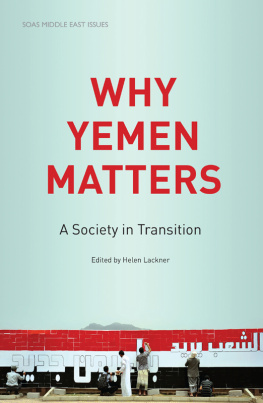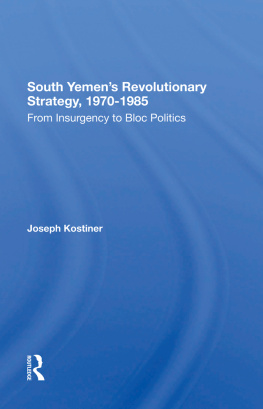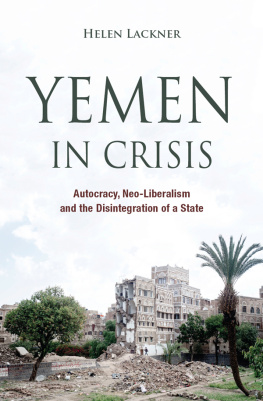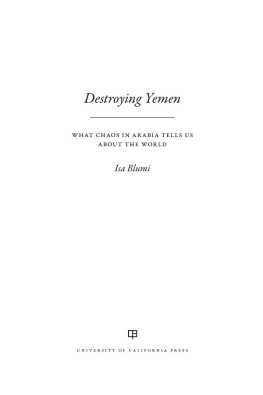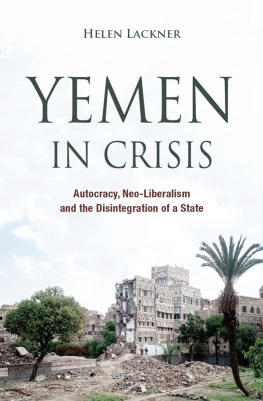HELEN LACKNER has been researching the Arabian Peninsula for over forty years and lived in Yemen for close to fifteen. She has worked as a consultant on social aspects of development in over thirty countries and specializes in rural issues, in particular water management and poverty alleviation. Her other publications include A House Built on Sand: A Political Economy of Saudi Arabia, PDR Yemen: Outpost of Socialist Development in Arabia and Yemen into the Twenty First Century: Continuity and Change (co-editor).
Why Yemen Matters is essential reading for anyone who wants to know where the future of Yemen lies after the toppling of Ali Abdullah Saleh. Leading scholars of Yemen address a wide range of topics from the structure of the Yemeni private sector and the transformation of tribal relations in the war in Saada to the geopolitics of the GCC initiative and the relationship of the youth rebellion to the traditional political parties. The authors shed light on the context of the Yemeni uprising in a way that not only helps us understand the current transitional period but also the outlines of Yemens future.
Charles Schmitz, President of the American Institute of Yemeni Studies
An up to date and wide-ranging guide to what is arguably the Arab worlds least known and most misunderstood state. Edited by one of Britains foremost authorities on Yemen, Why Yemen Matters brings together an impressive range of experts on the country to examine the contemporary reality of Yemen with all its contradictions and complexities. It will be of use and interest to academics, policy-makers, students and those simply interested in finding out more about Yemen. Politics, economics, culture, society and foreign relations are all addressed in a volume that emphatically explains why Yemen does indeed matter.
Michael Willis, Director of the Middle East Centre, St Antonys College, Oxford University
Other Titles in the Series
British-Egyptian Relations from Suez to the Present Day
Demystifying Syria
The Gulf Family: Kinship Policies and Modernity
Higher Education in the Gulf States: Shaping Economies, Politics and Culture
Oil and Democracy in Iraq
Popular Culture and Political Identity in the Arab Gulf States
Turkey, the US and Iraq
Political Islam: Context versus Ideology
SOAS MIDDLE EAST ISSUES
WHY YEMEN MATTERS
A Society in Transition
Edited by Helen Lackner

Published 2014 by Saqi Books
Copyright London Middle East Institute at SOAS 2014 Copyright for individual chapters rests with the authors.
This book is sold subject to the condition that it shall not, by way of trade or otherwise, be lent, resold, hired out, or otherwise circulated without the publishers prior consent in any form of binding or cover other than that in which it is published and without a similar condition including this condition being imposed on the subsequent purchaser.
First published in Great Britain 2014 by
Saqi Books
26 Westbourne Grove, London W2 5RH
www.saqibooks.co.uk
A full CIP record for this book is available from the British Library.
ISBN 978-0-86356-777-3
eISBN 978-0-86356-782-7
Printed and bound by Bookwell, Finland
The opinions expressed in this publication are those of the authors and do not reflect those of the British Yemeni Society, the LMEI or any other organisation associated with this volume.

SOAS, University of London, Russell Square, London WC1H 0XG
www.lmei.soas.ac.uk
CONTENTS
ACKNOWLEDGEMENTS
THIS BOOK AROSE from a conference held at SOAS and organized by the British Yemeni Society (BYS) in association with the London Middle East Institute in January 2013, under the title Yemen: Challenges for the Future. It brought together experts and academics, and was the first academic conference in the UK on Yemen in over 20 years. The idea of the conference came from Noel Brehony, chairman of the BYS, and Thanos Petouris, a member of the BYS Committee, and was convened by them, working closely with an academic and organizing committee from the BYS and SOAS composed of Dr Adel Aulaqi, Dr Noel Brehony, Dr Gabriele von Bruck, Louise Hosking, Helen Lackner, Thanos Petouris and Dr Shelagh Weir. Members of the BYS Committee offered invaluable advice and assistance.
The conference itself was attended by over 300 people from many different countries, demonstrating a much wider interest in Yemen than the organizers had anticipated. Yemeni participation was high. The contributors to the book are among the 40 people who presented papers at the conference. The conference would not have been possible without the active support and the generous sponsorship of our sponsors and in particular the MBI Al Jaber Foundation. The LMEI and the BYS want to thank all sponsors for their unquestioning willingness to allow the Committee, the conference and the book to take place with absolutely no guidance or interference with our independence. They wish to thank H. E. Sheikh Mohamed bin Issa al-Jaber for both his support and his personal participation in the conference. Particular thanks are due to Dr Hassan Hakimian, MBI Al Jaber Director of the London Middle East Institute, to Louise Hosking, administrator of the LMEI, and her staff for their major contributions, and for ensuring that the conference ran smoothly despite the unexpected number of participants. The BYS is grateful to the Seven Pillars of Wisdom Trust, Menas Associates and to Nexen Inc for supporting the publication of this book.
Above all, thanks to Noel Brehony for having the original idea of the conference and the book. He followed both up closely throughout the process, and patiently managed the complex negotiations between the three concerned institutions the BYS, LMEI and Saqi Books. As the saying goes, none of this would have happened without his contribution. Thanos Petouris made an indispensable contribution to preparing the conference, handling much of the discussion with potential participants. The editor also wants to thank all those who have provided information, read and criticized earlier drafts, and provided moral and practical support in the completion of this work in particular Abdul Rahman al-Eryani, Sarah Cleave, Diana Driscoll, Lynn Gaspard, John Gittings, Jamal al-Hajri, Hermione Harris, Christine McLelland, Munitta Muthanna and Charles Peyton. Finally, thanks are due to Dr Abdul Karim al-Eryani, who found the time to read the Introduction despite his extraordinarily busy schedule. Neither the British Yemeni Society nor the London Middle East Institute are responsible for the contents of the book, which does not reflect the views or positions of either institution, but exclusively those of the individual authors of each chapter. The wide range of interpretations of events in Yemen presented here shows that events in the country can be interpreted in a variety of ways, and the book itself reflects the understanding of each author, without implying that either the sponsors, the BYS or LMEI or their honorary presidents agree with any position presented.
NOTE ON TRANSLITERATION AND ABBREVIATIONS
ARABIC TRANSLITERATION IS ALWAYS problematic. In this book we have taken the following approach: we use one of the commonly used transliterations for the most frequently used words, whether names of places, people or organizations. With respect to people, we use the transliteration individuals use for themselves in the case of living personalities, which may lead to some inconsistencies. For words that only appear in a specific chapter, each author has used her/his transliteration system, in most cases that of the IJMES, but diacriticals have been removed to make reading easier.
Next page
